Literature Review: Employee Turnover & Staff Performance in Hotels
VerifiedAdded on 2023/06/15
|23
|5483
|438
Literature Review
AI Summary
This literature review examines the impact of employee turnover on staff performance in the hotel industry. It identifies staff performance as the dependent variable and employee turnover as the independent variable, exploring the cause-and-effect relationship between them through the lens of Tuckman's theory. The review delves into various factors affecting staff performance, including HR practices, environmental conditions, motivation, work stress, and leadership competencies. It synthesizes existing research to highlight the importance of HRM practices, employee engagement, and effective leadership in mitigating the negative effects of turnover and improving overall staff performance and customer satisfaction. The review also touches upon the role of line managers and the significance of service quality and innovative behaviors in the context of employee performance within the hotel sector. Desklib provides access to this document along with a suite of AI-powered study tools to enhance understanding and research capabilities.
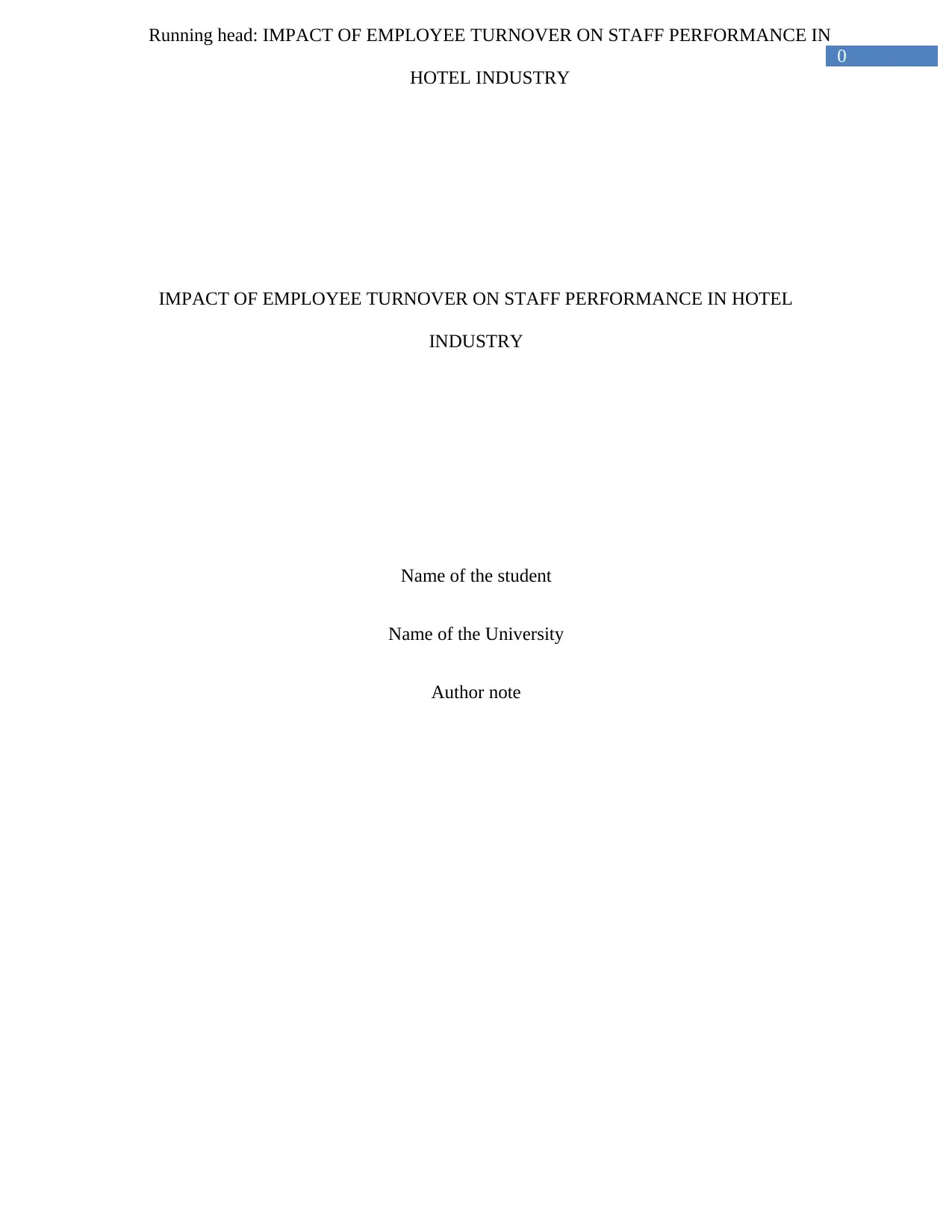
0
Running head: IMPACT OF EMPLOYEE TURNOVER ON STAFF PERFORMANCE IN
HOTEL INDUSTRY
IMPACT OF EMPLOYEE TURNOVER ON STAFF PERFORMANCE IN HOTEL
INDUSTRY
Name of the student
Name of the University
Author note
Running head: IMPACT OF EMPLOYEE TURNOVER ON STAFF PERFORMANCE IN
HOTEL INDUSTRY
IMPACT OF EMPLOYEE TURNOVER ON STAFF PERFORMANCE IN HOTEL
INDUSTRY
Name of the student
Name of the University
Author note
Paraphrase This Document
Need a fresh take? Get an instant paraphrase of this document with our AI Paraphraser
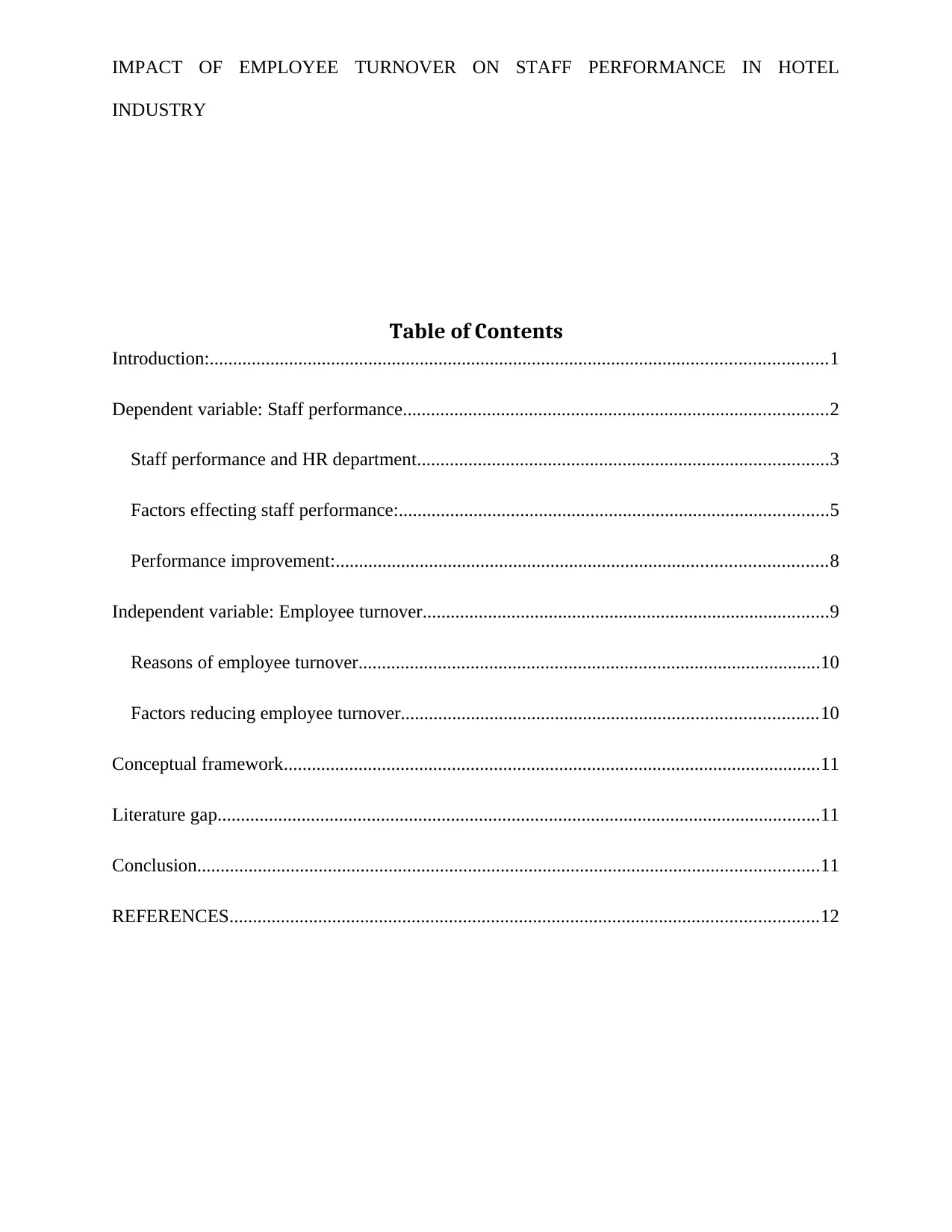
IMPACT OF EMPLOYEE TURNOVER ON STAFF PERFORMANCE IN HOTEL
INDUSTRY
Table of Contents
Introduction:....................................................................................................................................1
Dependent variable: Staff performance...........................................................................................2
Staff performance and HR department........................................................................................3
Factors effecting staff performance:............................................................................................5
Performance improvement:.........................................................................................................8
Independent variable: Employee turnover.......................................................................................9
Reasons of employee turnover...................................................................................................10
Factors reducing employee turnover.........................................................................................10
Conceptual framework...................................................................................................................11
Literature gap.................................................................................................................................11
Conclusion.....................................................................................................................................11
REFERENCES..............................................................................................................................12
INDUSTRY
Table of Contents
Introduction:....................................................................................................................................1
Dependent variable: Staff performance...........................................................................................2
Staff performance and HR department........................................................................................3
Factors effecting staff performance:............................................................................................5
Performance improvement:.........................................................................................................8
Independent variable: Employee turnover.......................................................................................9
Reasons of employee turnover...................................................................................................10
Factors reducing employee turnover.........................................................................................10
Conceptual framework...................................................................................................................11
Literature gap.................................................................................................................................11
Conclusion.....................................................................................................................................11
REFERENCES..............................................................................................................................12
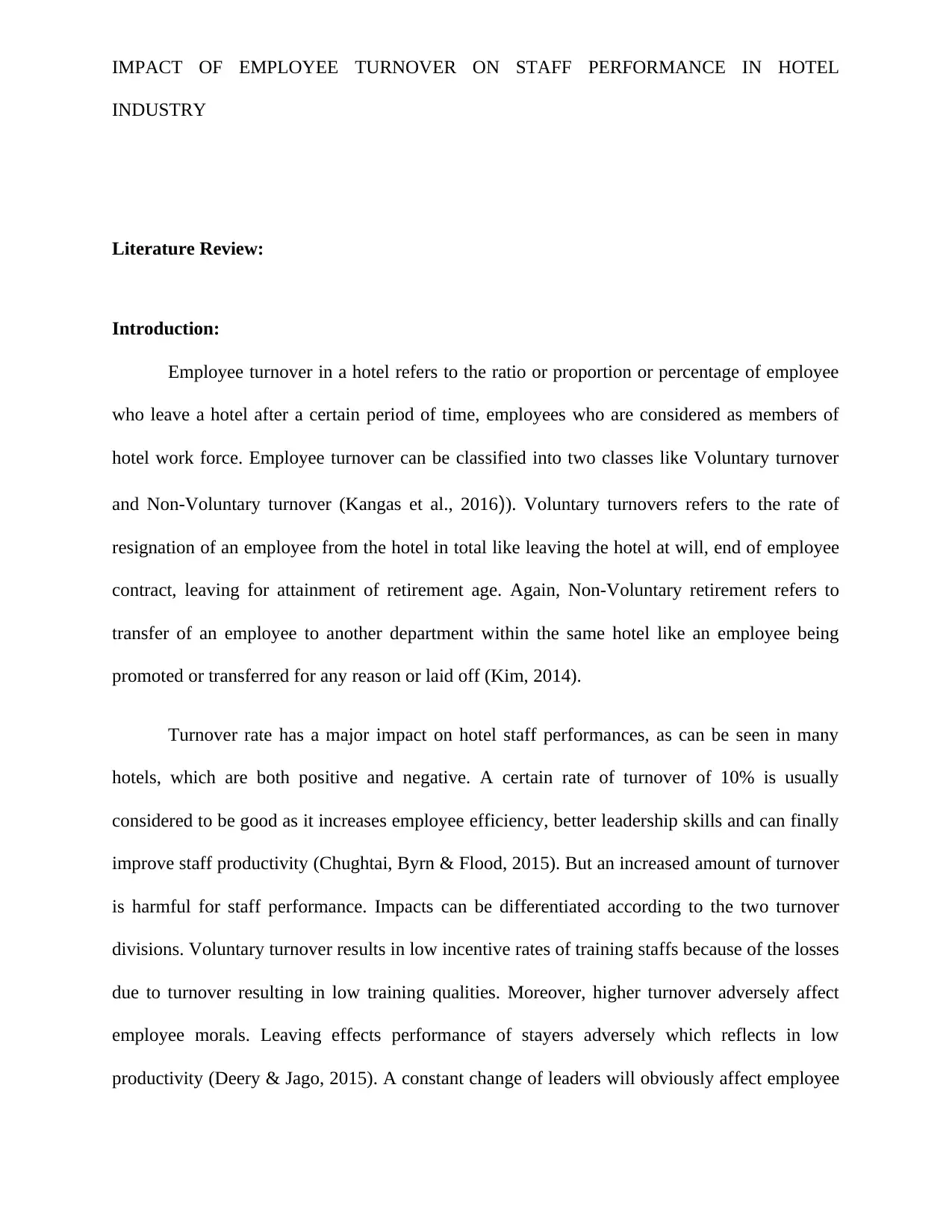
IMPACT OF EMPLOYEE TURNOVER ON STAFF PERFORMANCE IN HOTEL
INDUSTRY
Literature Review:
Introduction:
Employee turnover in a hotel refers to the ratio or proportion or percentage of employee
who leave a hotel after a certain period of time, employees who are considered as members of
hotel work force. Employee turnover can be classified into two classes like Voluntary turnover
and Non-Voluntary turnover (Kangas et al., 2016)). Voluntary turnovers refers to the rate of
resignation of an employee from the hotel in total like leaving the hotel at will, end of employee
contract, leaving for attainment of retirement age. Again, Non-Voluntary retirement refers to
transfer of an employee to another department within the same hotel like an employee being
promoted or transferred for any reason or laid off (Kim, 2014).
Turnover rate has a major impact on hotel staff performances, as can be seen in many
hotels, which are both positive and negative. A certain rate of turnover of 10% is usually
considered to be good as it increases employee efficiency, better leadership skills and can finally
improve staff productivity (Chughtai, Byrn & Flood, 2015). But an increased amount of turnover
is harmful for staff performance. Impacts can be differentiated according to the two turnover
divisions. Voluntary turnover results in low incentive rates of training staffs because of the losses
due to turnover resulting in low training qualities. Moreover, higher turnover adversely affect
employee morals. Leaving effects performance of stayers adversely which reflects in low
productivity (Deery & Jago, 2015). A constant change of leaders will obviously affect employee
INDUSTRY
Literature Review:
Introduction:
Employee turnover in a hotel refers to the ratio or proportion or percentage of employee
who leave a hotel after a certain period of time, employees who are considered as members of
hotel work force. Employee turnover can be classified into two classes like Voluntary turnover
and Non-Voluntary turnover (Kangas et al., 2016)). Voluntary turnovers refers to the rate of
resignation of an employee from the hotel in total like leaving the hotel at will, end of employee
contract, leaving for attainment of retirement age. Again, Non-Voluntary retirement refers to
transfer of an employee to another department within the same hotel like an employee being
promoted or transferred for any reason or laid off (Kim, 2014).
Turnover rate has a major impact on hotel staff performances, as can be seen in many
hotels, which are both positive and negative. A certain rate of turnover of 10% is usually
considered to be good as it increases employee efficiency, better leadership skills and can finally
improve staff productivity (Chughtai, Byrn & Flood, 2015). But an increased amount of turnover
is harmful for staff performance. Impacts can be differentiated according to the two turnover
divisions. Voluntary turnover results in low incentive rates of training staffs because of the losses
due to turnover resulting in low training qualities. Moreover, higher turnover adversely affect
employee morals. Leaving effects performance of stayers adversely which reflects in low
productivity (Deery & Jago, 2015). A constant change of leaders will obviously affect employee
⊘ This is a preview!⊘
Do you want full access?
Subscribe today to unlock all pages.

Trusted by 1+ million students worldwide
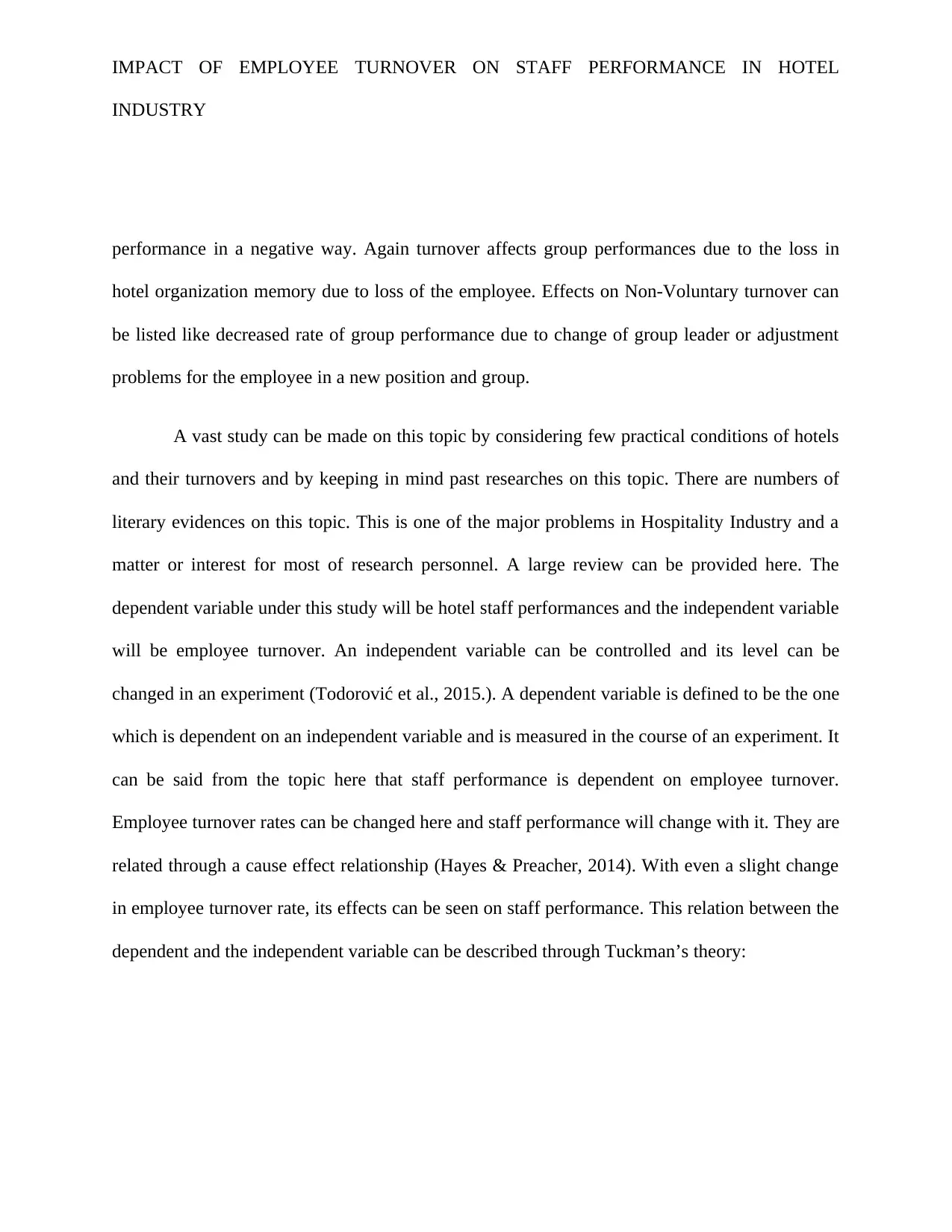
IMPACT OF EMPLOYEE TURNOVER ON STAFF PERFORMANCE IN HOTEL
INDUSTRY
performance in a negative way. Again turnover affects group performances due to the loss in
hotel organization memory due to loss of the employee. Effects on Non-Voluntary turnover can
be listed like decreased rate of group performance due to change of group leader or adjustment
problems for the employee in a new position and group.
A vast study can be made on this topic by considering few practical conditions of hotels
and their turnovers and by keeping in mind past researches on this topic. There are numbers of
literary evidences on this topic. This is one of the major problems in Hospitality Industry and a
matter or interest for most of research personnel. A large review can be provided here. The
dependent variable under this study will be hotel staff performances and the independent variable
will be employee turnover. An independent variable can be controlled and its level can be
changed in an experiment (Todorović et al., 2015.). A dependent variable is defined to be the one
which is dependent on an independent variable and is measured in the course of an experiment. It
can be said from the topic here that staff performance is dependent on employee turnover.
Employee turnover rates can be changed here and staff performance will change with it. They are
related through a cause effect relationship (Hayes & Preacher, 2014). With even a slight change
in employee turnover rate, its effects can be seen on staff performance. This relation between the
dependent and the independent variable can be described through Tuckman’s theory:
INDUSTRY
performance in a negative way. Again turnover affects group performances due to the loss in
hotel organization memory due to loss of the employee. Effects on Non-Voluntary turnover can
be listed like decreased rate of group performance due to change of group leader or adjustment
problems for the employee in a new position and group.
A vast study can be made on this topic by considering few practical conditions of hotels
and their turnovers and by keeping in mind past researches on this topic. There are numbers of
literary evidences on this topic. This is one of the major problems in Hospitality Industry and a
matter or interest for most of research personnel. A large review can be provided here. The
dependent variable under this study will be hotel staff performances and the independent variable
will be employee turnover. An independent variable can be controlled and its level can be
changed in an experiment (Todorović et al., 2015.). A dependent variable is defined to be the one
which is dependent on an independent variable and is measured in the course of an experiment. It
can be said from the topic here that staff performance is dependent on employee turnover.
Employee turnover rates can be changed here and staff performance will change with it. They are
related through a cause effect relationship (Hayes & Preacher, 2014). With even a slight change
in employee turnover rate, its effects can be seen on staff performance. This relation between the
dependent and the independent variable can be described through Tuckman’s theory:
Paraphrase This Document
Need a fresh take? Get an instant paraphrase of this document with our AI Paraphraser
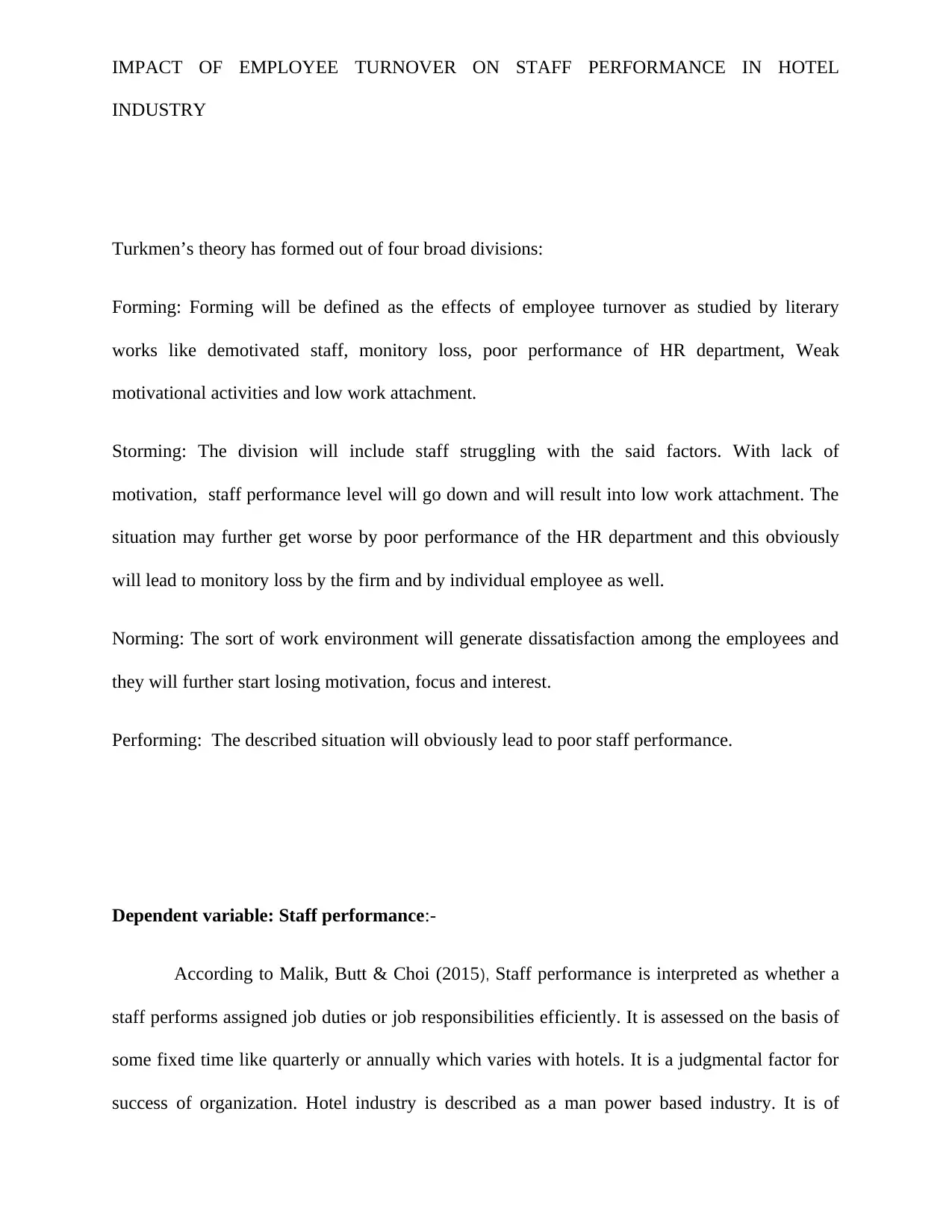
IMPACT OF EMPLOYEE TURNOVER ON STAFF PERFORMANCE IN HOTEL
INDUSTRY
Turkmen’s theory has formed out of four broad divisions:
Forming: Forming will be defined as the effects of employee turnover as studied by literary
works like demotivated staff, monitory loss, poor performance of HR department, Weak
motivational activities and low work attachment.
Storming: The division will include staff struggling with the said factors. With lack of
motivation, staff performance level will go down and will result into low work attachment. The
situation may further get worse by poor performance of the HR department and this obviously
will lead to monitory loss by the firm and by individual employee as well.
Norming: The sort of work environment will generate dissatisfaction among the employees and
they will further start losing motivation, focus and interest.
Performing: The described situation will obviously lead to poor staff performance.
Dependent variable: Staff performance:-
According to Malik, Butt & Choi (2015), Staff performance is interpreted as whether a
staff performs assigned job duties or job responsibilities efficiently. It is assessed on the basis of
some fixed time like quarterly or annually which varies with hotels. It is a judgmental factor for
success of organization. Hotel industry is described as a man power based industry. It is of
INDUSTRY
Turkmen’s theory has formed out of four broad divisions:
Forming: Forming will be defined as the effects of employee turnover as studied by literary
works like demotivated staff, monitory loss, poor performance of HR department, Weak
motivational activities and low work attachment.
Storming: The division will include staff struggling with the said factors. With lack of
motivation, staff performance level will go down and will result into low work attachment. The
situation may further get worse by poor performance of the HR department and this obviously
will lead to monitory loss by the firm and by individual employee as well.
Norming: The sort of work environment will generate dissatisfaction among the employees and
they will further start losing motivation, focus and interest.
Performing: The described situation will obviously lead to poor staff performance.
Dependent variable: Staff performance:-
According to Malik, Butt & Choi (2015), Staff performance is interpreted as whether a
staff performs assigned job duties or job responsibilities efficiently. It is assessed on the basis of
some fixed time like quarterly or annually which varies with hotels. It is a judgmental factor for
success of organization. Hotel industry is described as a man power based industry. It is of
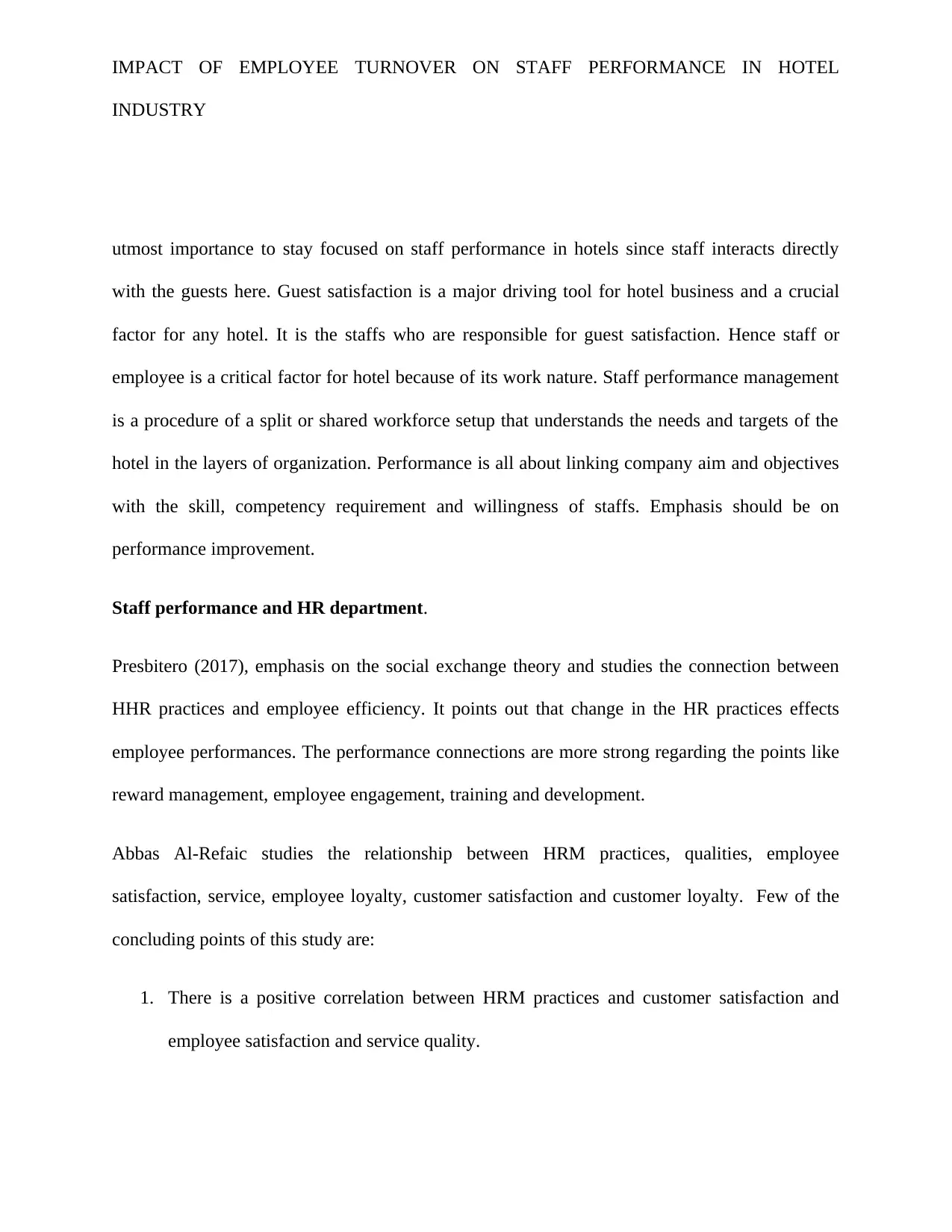
IMPACT OF EMPLOYEE TURNOVER ON STAFF PERFORMANCE IN HOTEL
INDUSTRY
utmost importance to stay focused on staff performance in hotels since staff interacts directly
with the guests here. Guest satisfaction is a major driving tool for hotel business and a crucial
factor for any hotel. It is the staffs who are responsible for guest satisfaction. Hence staff or
employee is a critical factor for hotel because of its work nature. Staff performance management
is a procedure of a split or shared workforce setup that understands the needs and targets of the
hotel in the layers of organization. Performance is all about linking company aim and objectives
with the skill, competency requirement and willingness of staffs. Emphasis should be on
performance improvement.
Staff performance and HR department.
Presbitero (2017), emphasis on the social exchange theory and studies the connection between
HHR practices and employee efficiency. It points out that change in the HR practices effects
employee performances. The performance connections are more strong regarding the points like
reward management, employee engagement, training and development.
Abbas Al-Refaic studies the relationship between HRM practices, qualities, employee
satisfaction, service, employee loyalty, customer satisfaction and customer loyalty. Few of the
concluding points of this study are:
1. There is a positive correlation between HRM practices and customer satisfaction and
employee satisfaction and service quality.
INDUSTRY
utmost importance to stay focused on staff performance in hotels since staff interacts directly
with the guests here. Guest satisfaction is a major driving tool for hotel business and a crucial
factor for any hotel. It is the staffs who are responsible for guest satisfaction. Hence staff or
employee is a critical factor for hotel because of its work nature. Staff performance management
is a procedure of a split or shared workforce setup that understands the needs and targets of the
hotel in the layers of organization. Performance is all about linking company aim and objectives
with the skill, competency requirement and willingness of staffs. Emphasis should be on
performance improvement.
Staff performance and HR department.
Presbitero (2017), emphasis on the social exchange theory and studies the connection between
HHR practices and employee efficiency. It points out that change in the HR practices effects
employee performances. The performance connections are more strong regarding the points like
reward management, employee engagement, training and development.
Abbas Al-Refaic studies the relationship between HRM practices, qualities, employee
satisfaction, service, employee loyalty, customer satisfaction and customer loyalty. Few of the
concluding points of this study are:
1. There is a positive correlation between HRM practices and customer satisfaction and
employee satisfaction and service quality.
⊘ This is a preview!⊘
Do you want full access?
Subscribe today to unlock all pages.

Trusted by 1+ million students worldwide
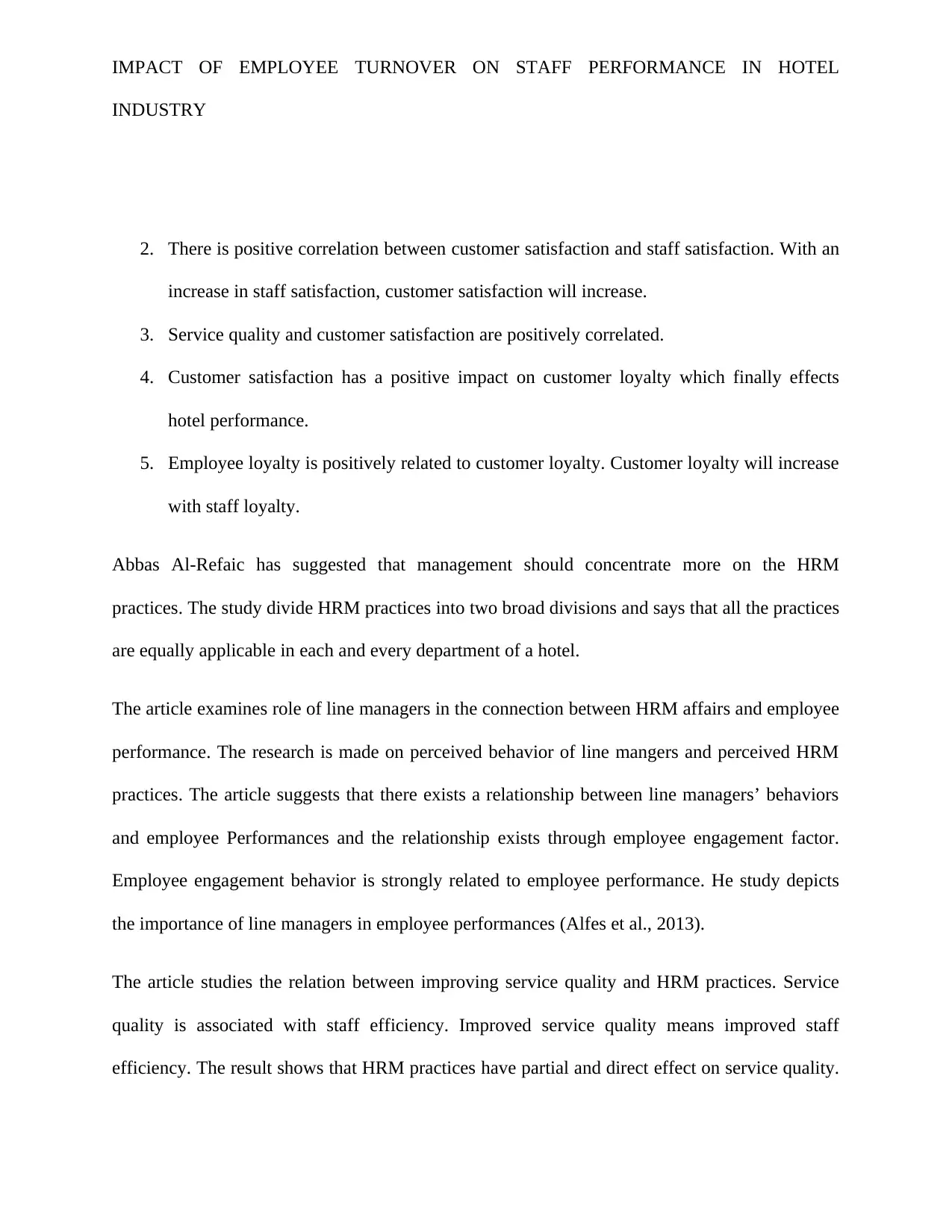
IMPACT OF EMPLOYEE TURNOVER ON STAFF PERFORMANCE IN HOTEL
INDUSTRY
2. There is positive correlation between customer satisfaction and staff satisfaction. With an
increase in staff satisfaction, customer satisfaction will increase.
3. Service quality and customer satisfaction are positively correlated.
4. Customer satisfaction has a positive impact on customer loyalty which finally effects
hotel performance.
5. Employee loyalty is positively related to customer loyalty. Customer loyalty will increase
with staff loyalty.
Abbas Al-Refaic has suggested that management should concentrate more on the HRM
practices. The study divide HRM practices into two broad divisions and says that all the practices
are equally applicable in each and every department of a hotel.
The article examines role of line managers in the connection between HRM affairs and employee
performance. The research is made on perceived behavior of line mangers and perceived HRM
practices. The article suggests that there exists a relationship between line managers’ behaviors
and employee Performances and the relationship exists through employee engagement factor.
Employee engagement behavior is strongly related to employee performance. He study depicts
the importance of line managers in employee performances (Alfes et al., 2013).
The article studies the relation between improving service quality and HRM practices. Service
quality is associated with staff efficiency. Improved service quality means improved staff
efficiency. The result shows that HRM practices have partial and direct effect on service quality.
INDUSTRY
2. There is positive correlation between customer satisfaction and staff satisfaction. With an
increase in staff satisfaction, customer satisfaction will increase.
3. Service quality and customer satisfaction are positively correlated.
4. Customer satisfaction has a positive impact on customer loyalty which finally effects
hotel performance.
5. Employee loyalty is positively related to customer loyalty. Customer loyalty will increase
with staff loyalty.
Abbas Al-Refaic has suggested that management should concentrate more on the HRM
practices. The study divide HRM practices into two broad divisions and says that all the practices
are equally applicable in each and every department of a hotel.
The article examines role of line managers in the connection between HRM affairs and employee
performance. The research is made on perceived behavior of line mangers and perceived HRM
practices. The article suggests that there exists a relationship between line managers’ behaviors
and employee Performances and the relationship exists through employee engagement factor.
Employee engagement behavior is strongly related to employee performance. He study depicts
the importance of line managers in employee performances (Alfes et al., 2013).
The article studies the relation between improving service quality and HRM practices. Service
quality is associated with staff efficiency. Improved service quality means improved staff
efficiency. The result shows that HRM practices have partial and direct effect on service quality.
Paraphrase This Document
Need a fresh take? Get an instant paraphrase of this document with our AI Paraphraser
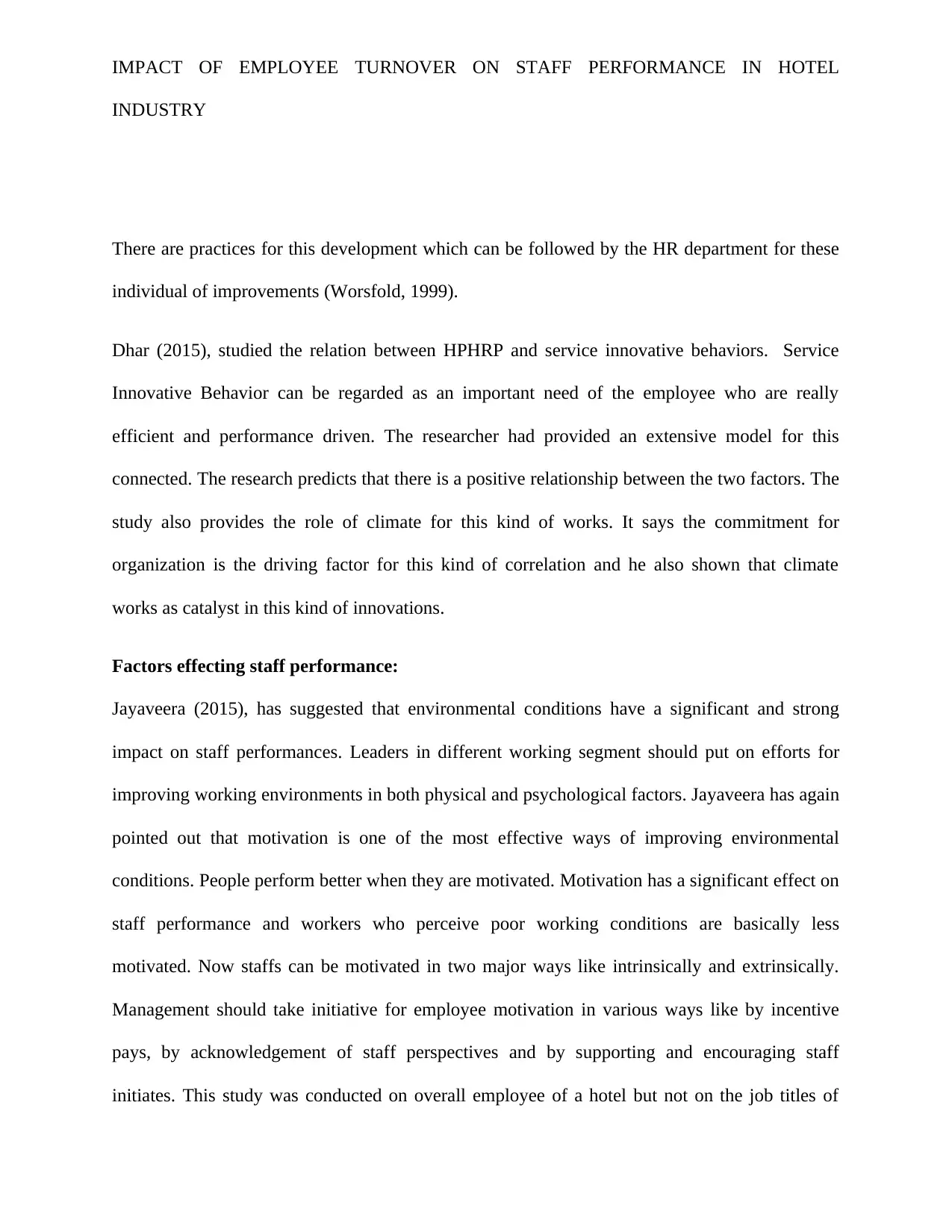
IMPACT OF EMPLOYEE TURNOVER ON STAFF PERFORMANCE IN HOTEL
INDUSTRY
There are practices for this development which can be followed by the HR department for these
individual of improvements (Worsfold, 1999).
Dhar (2015), studied the relation between HPHRP and service innovative behaviors. Service
Innovative Behavior can be regarded as an important need of the employee who are really
efficient and performance driven. The researcher had provided an extensive model for this
connected. The research predicts that there is a positive relationship between the two factors. The
study also provides the role of climate for this kind of works. It says the commitment for
organization is the driving factor for this kind of correlation and he also shown that climate
works as catalyst in this kind of innovations.
Factors effecting staff performance:
Jayaveera (2015), has suggested that environmental conditions have a significant and strong
impact on staff performances. Leaders in different working segment should put on efforts for
improving working environments in both physical and psychological factors. Jayaveera has again
pointed out that motivation is one of the most effective ways of improving environmental
conditions. People perform better when they are motivated. Motivation has a significant effect on
staff performance and workers who perceive poor working conditions are basically less
motivated. Now staffs can be motivated in two major ways like intrinsically and extrinsically.
Management should take initiative for employee motivation in various ways like by incentive
pays, by acknowledgement of staff perspectives and by supporting and encouraging staff
initiates. This study was conducted on overall employee of a hotel but not on the job titles of
INDUSTRY
There are practices for this development which can be followed by the HR department for these
individual of improvements (Worsfold, 1999).
Dhar (2015), studied the relation between HPHRP and service innovative behaviors. Service
Innovative Behavior can be regarded as an important need of the employee who are really
efficient and performance driven. The researcher had provided an extensive model for this
connected. The research predicts that there is a positive relationship between the two factors. The
study also provides the role of climate for this kind of works. It says the commitment for
organization is the driving factor for this kind of correlation and he also shown that climate
works as catalyst in this kind of innovations.
Factors effecting staff performance:
Jayaveera (2015), has suggested that environmental conditions have a significant and strong
impact on staff performances. Leaders in different working segment should put on efforts for
improving working environments in both physical and psychological factors. Jayaveera has again
pointed out that motivation is one of the most effective ways of improving environmental
conditions. People perform better when they are motivated. Motivation has a significant effect on
staff performance and workers who perceive poor working conditions are basically less
motivated. Now staffs can be motivated in two major ways like intrinsically and extrinsically.
Management should take initiative for employee motivation in various ways like by incentive
pays, by acknowledgement of staff perspectives and by supporting and encouraging staff
initiates. This study was conducted on overall employee of a hotel but not on the job titles of
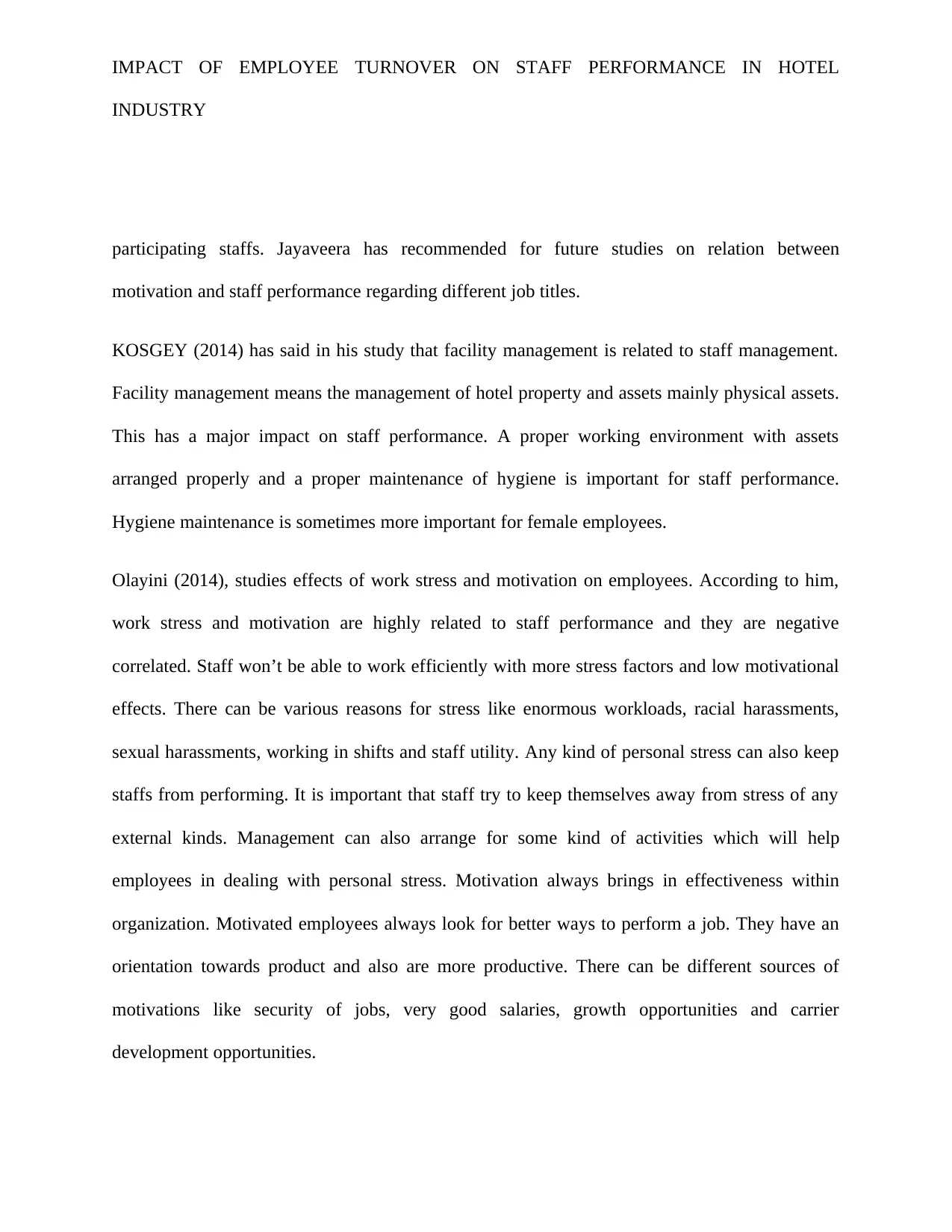
IMPACT OF EMPLOYEE TURNOVER ON STAFF PERFORMANCE IN HOTEL
INDUSTRY
participating staffs. Jayaveera has recommended for future studies on relation between
motivation and staff performance regarding different job titles.
KOSGEY (2014) has said in his study that facility management is related to staff management.
Facility management means the management of hotel property and assets mainly physical assets.
This has a major impact on staff performance. A proper working environment with assets
arranged properly and a proper maintenance of hygiene is important for staff performance.
Hygiene maintenance is sometimes more important for female employees.
Olayini (2014), studies effects of work stress and motivation on employees. According to him,
work stress and motivation are highly related to staff performance and they are negative
correlated. Staff won’t be able to work efficiently with more stress factors and low motivational
effects. There can be various reasons for stress like enormous workloads, racial harassments,
sexual harassments, working in shifts and staff utility. Any kind of personal stress can also keep
staffs from performing. It is important that staff try to keep themselves away from stress of any
external kinds. Management can also arrange for some kind of activities which will help
employees in dealing with personal stress. Motivation always brings in effectiveness within
organization. Motivated employees always look for better ways to perform a job. They have an
orientation towards product and also are more productive. There can be different sources of
motivations like security of jobs, very good salaries, growth opportunities and carrier
development opportunities.
INDUSTRY
participating staffs. Jayaveera has recommended for future studies on relation between
motivation and staff performance regarding different job titles.
KOSGEY (2014) has said in his study that facility management is related to staff management.
Facility management means the management of hotel property and assets mainly physical assets.
This has a major impact on staff performance. A proper working environment with assets
arranged properly and a proper maintenance of hygiene is important for staff performance.
Hygiene maintenance is sometimes more important for female employees.
Olayini (2014), studies effects of work stress and motivation on employees. According to him,
work stress and motivation are highly related to staff performance and they are negative
correlated. Staff won’t be able to work efficiently with more stress factors and low motivational
effects. There can be various reasons for stress like enormous workloads, racial harassments,
sexual harassments, working in shifts and staff utility. Any kind of personal stress can also keep
staffs from performing. It is important that staff try to keep themselves away from stress of any
external kinds. Management can also arrange for some kind of activities which will help
employees in dealing with personal stress. Motivation always brings in effectiveness within
organization. Motivated employees always look for better ways to perform a job. They have an
orientation towards product and also are more productive. There can be different sources of
motivations like security of jobs, very good salaries, growth opportunities and carrier
development opportunities.
⊘ This is a preview!⊘
Do you want full access?
Subscribe today to unlock all pages.

Trusted by 1+ million students worldwide
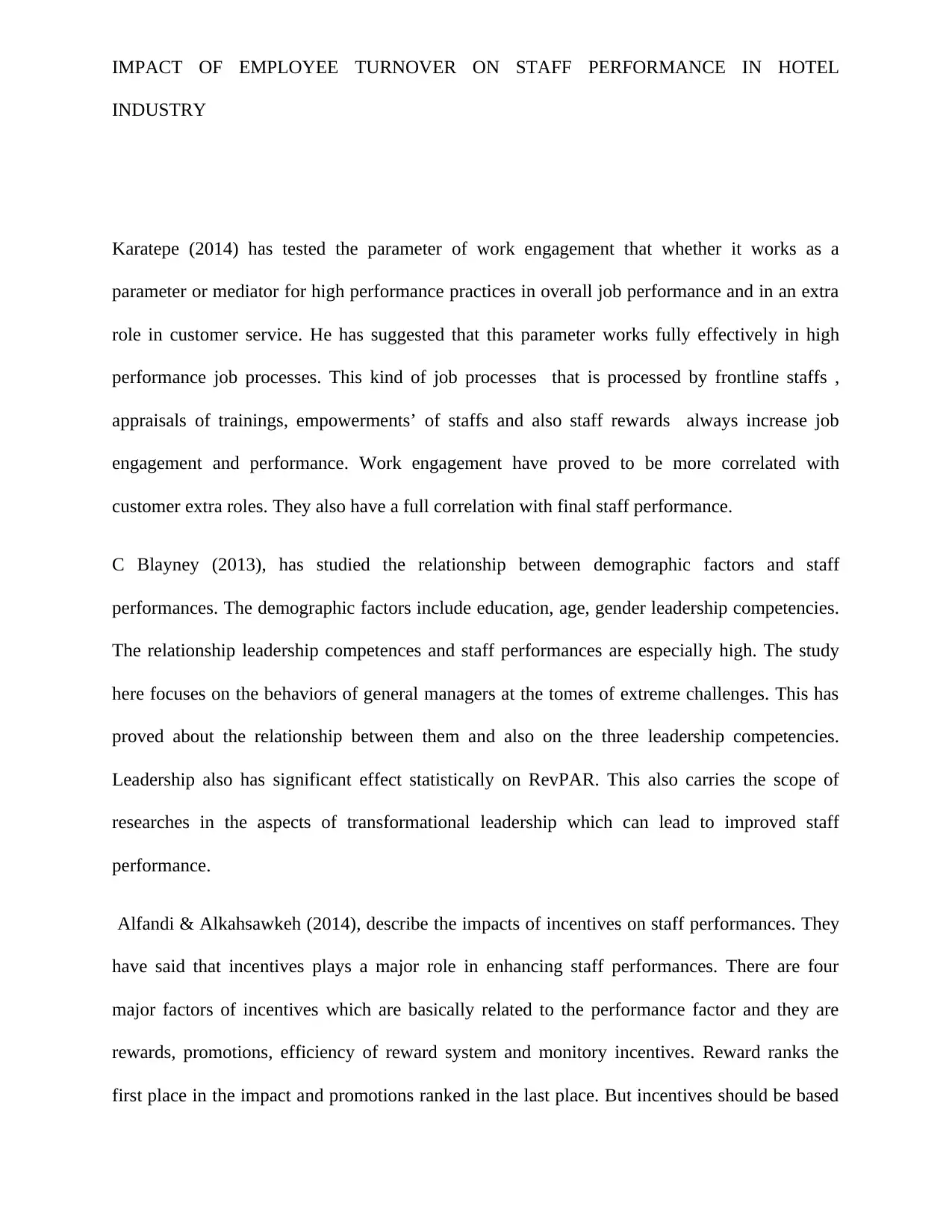
IMPACT OF EMPLOYEE TURNOVER ON STAFF PERFORMANCE IN HOTEL
INDUSTRY
Karatepe (2014) has tested the parameter of work engagement that whether it works as a
parameter or mediator for high performance practices in overall job performance and in an extra
role in customer service. He has suggested that this parameter works fully effectively in high
performance job processes. This kind of job processes that is processed by frontline staffs ,
appraisals of trainings, empowerments’ of staffs and also staff rewards always increase job
engagement and performance. Work engagement have proved to be more correlated with
customer extra roles. They also have a full correlation with final staff performance.
C Blayney (2013), has studied the relationship between demographic factors and staff
performances. The demographic factors include education, age, gender leadership competencies.
The relationship leadership competences and staff performances are especially high. The study
here focuses on the behaviors of general managers at the tomes of extreme challenges. This has
proved about the relationship between them and also on the three leadership competencies.
Leadership also has significant effect statistically on RevPAR. This also carries the scope of
researches in the aspects of transformational leadership which can lead to improved staff
performance.
Alfandi & Alkahsawkeh (2014), describe the impacts of incentives on staff performances. They
have said that incentives plays a major role in enhancing staff performances. There are four
major factors of incentives which are basically related to the performance factor and they are
rewards, promotions, efficiency of reward system and monitory incentives. Reward ranks the
first place in the impact and promotions ranked in the last place. But incentives should be based
INDUSTRY
Karatepe (2014) has tested the parameter of work engagement that whether it works as a
parameter or mediator for high performance practices in overall job performance and in an extra
role in customer service. He has suggested that this parameter works fully effectively in high
performance job processes. This kind of job processes that is processed by frontline staffs ,
appraisals of trainings, empowerments’ of staffs and also staff rewards always increase job
engagement and performance. Work engagement have proved to be more correlated with
customer extra roles. They also have a full correlation with final staff performance.
C Blayney (2013), has studied the relationship between demographic factors and staff
performances. The demographic factors include education, age, gender leadership competencies.
The relationship leadership competences and staff performances are especially high. The study
here focuses on the behaviors of general managers at the tomes of extreme challenges. This has
proved about the relationship between them and also on the three leadership competencies.
Leadership also has significant effect statistically on RevPAR. This also carries the scope of
researches in the aspects of transformational leadership which can lead to improved staff
performance.
Alfandi & Alkahsawkeh (2014), describe the impacts of incentives on staff performances. They
have said that incentives plays a major role in enhancing staff performances. There are four
major factors of incentives which are basically related to the performance factor and they are
rewards, promotions, efficiency of reward system and monitory incentives. Reward ranks the
first place in the impact and promotions ranked in the last place. But incentives should be based
Paraphrase This Document
Need a fresh take? Get an instant paraphrase of this document with our AI Paraphraser
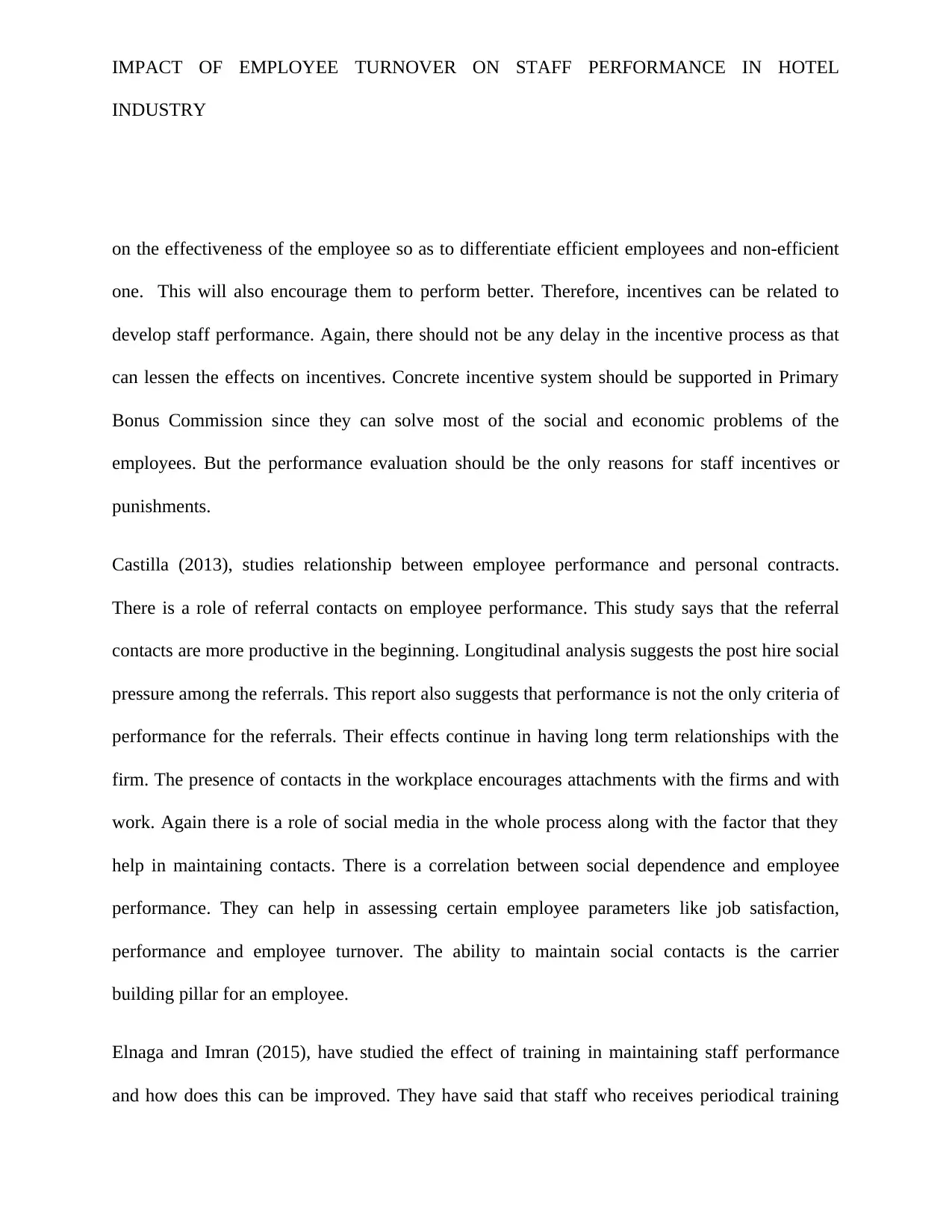
IMPACT OF EMPLOYEE TURNOVER ON STAFF PERFORMANCE IN HOTEL
INDUSTRY
on the effectiveness of the employee so as to differentiate efficient employees and non-efficient
one. This will also encourage them to perform better. Therefore, incentives can be related to
develop staff performance. Again, there should not be any delay in the incentive process as that
can lessen the effects on incentives. Concrete incentive system should be supported in Primary
Bonus Commission since they can solve most of the social and economic problems of the
employees. But the performance evaluation should be the only reasons for staff incentives or
punishments.
Castilla (2013), studies relationship between employee performance and personal contracts.
There is a role of referral contacts on employee performance. This study says that the referral
contacts are more productive in the beginning. Longitudinal analysis suggests the post hire social
pressure among the referrals. This report also suggests that performance is not the only criteria of
performance for the referrals. Their effects continue in having long term relationships with the
firm. The presence of contacts in the workplace encourages attachments with the firms and with
work. Again there is a role of social media in the whole process along with the factor that they
help in maintaining contacts. There is a correlation between social dependence and employee
performance. They can help in assessing certain employee parameters like job satisfaction,
performance and employee turnover. The ability to maintain social contacts is the carrier
building pillar for an employee.
Elnaga and Imran (2015), have studied the effect of training in maintaining staff performance
and how does this can be improved. They have said that staff who receives periodical training
INDUSTRY
on the effectiveness of the employee so as to differentiate efficient employees and non-efficient
one. This will also encourage them to perform better. Therefore, incentives can be related to
develop staff performance. Again, there should not be any delay in the incentive process as that
can lessen the effects on incentives. Concrete incentive system should be supported in Primary
Bonus Commission since they can solve most of the social and economic problems of the
employees. But the performance evaluation should be the only reasons for staff incentives or
punishments.
Castilla (2013), studies relationship between employee performance and personal contracts.
There is a role of referral contacts on employee performance. This study says that the referral
contacts are more productive in the beginning. Longitudinal analysis suggests the post hire social
pressure among the referrals. This report also suggests that performance is not the only criteria of
performance for the referrals. Their effects continue in having long term relationships with the
firm. The presence of contacts in the workplace encourages attachments with the firms and with
work. Again there is a role of social media in the whole process along with the factor that they
help in maintaining contacts. There is a correlation between social dependence and employee
performance. They can help in assessing certain employee parameters like job satisfaction,
performance and employee turnover. The ability to maintain social contacts is the carrier
building pillar for an employee.
Elnaga and Imran (2015), have studied the effect of training in maintaining staff performance
and how does this can be improved. They have said that staff who receives periodical training
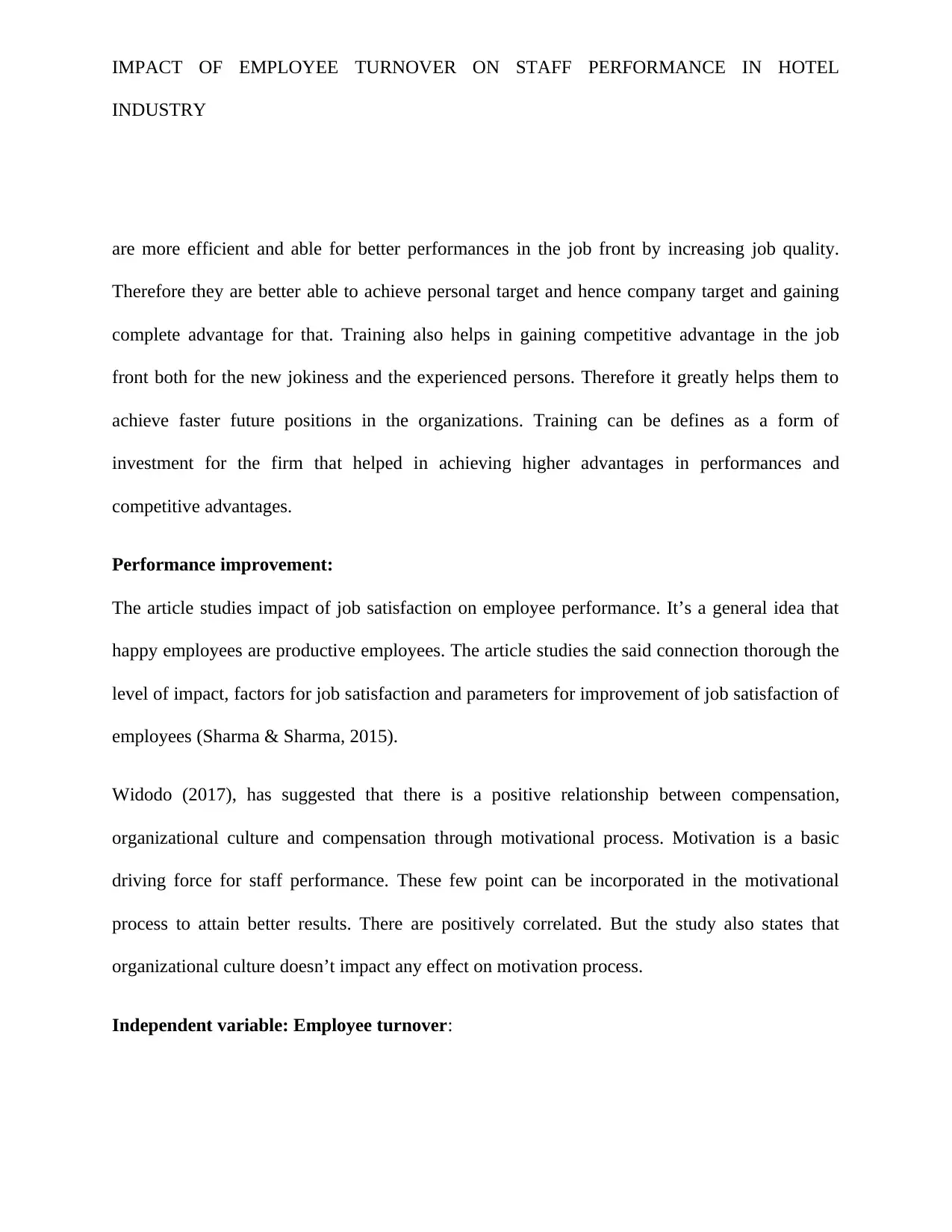
IMPACT OF EMPLOYEE TURNOVER ON STAFF PERFORMANCE IN HOTEL
INDUSTRY
are more efficient and able for better performances in the job front by increasing job quality.
Therefore they are better able to achieve personal target and hence company target and gaining
complete advantage for that. Training also helps in gaining competitive advantage in the job
front both for the new jokiness and the experienced persons. Therefore it greatly helps them to
achieve faster future positions in the organizations. Training can be defines as a form of
investment for the firm that helped in achieving higher advantages in performances and
competitive advantages.
Performance improvement:
The article studies impact of job satisfaction on employee performance. It’s a general idea that
happy employees are productive employees. The article studies the said connection thorough the
level of impact, factors for job satisfaction and parameters for improvement of job satisfaction of
employees (Sharma & Sharma, 2015).
Widodo (2017), has suggested that there is a positive relationship between compensation,
organizational culture and compensation through motivational process. Motivation is a basic
driving force for staff performance. These few point can be incorporated in the motivational
process to attain better results. There are positively correlated. But the study also states that
organizational culture doesn’t impact any effect on motivation process.
Independent variable: Employee turnover:
INDUSTRY
are more efficient and able for better performances in the job front by increasing job quality.
Therefore they are better able to achieve personal target and hence company target and gaining
complete advantage for that. Training also helps in gaining competitive advantage in the job
front both for the new jokiness and the experienced persons. Therefore it greatly helps them to
achieve faster future positions in the organizations. Training can be defines as a form of
investment for the firm that helped in achieving higher advantages in performances and
competitive advantages.
Performance improvement:
The article studies impact of job satisfaction on employee performance. It’s a general idea that
happy employees are productive employees. The article studies the said connection thorough the
level of impact, factors for job satisfaction and parameters for improvement of job satisfaction of
employees (Sharma & Sharma, 2015).
Widodo (2017), has suggested that there is a positive relationship between compensation,
organizational culture and compensation through motivational process. Motivation is a basic
driving force for staff performance. These few point can be incorporated in the motivational
process to attain better results. There are positively correlated. But the study also states that
organizational culture doesn’t impact any effect on motivation process.
Independent variable: Employee turnover:
⊘ This is a preview!⊘
Do you want full access?
Subscribe today to unlock all pages.

Trusted by 1+ million students worldwide
1 out of 23
Related Documents
Your All-in-One AI-Powered Toolkit for Academic Success.
+13062052269
info@desklib.com
Available 24*7 on WhatsApp / Email
![[object Object]](/_next/static/media/star-bottom.7253800d.svg)
Unlock your academic potential
Copyright © 2020–2026 A2Z Services. All Rights Reserved. Developed and managed by ZUCOL.





